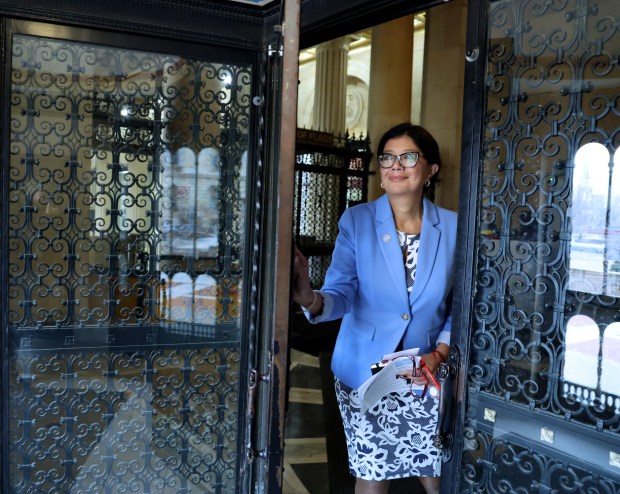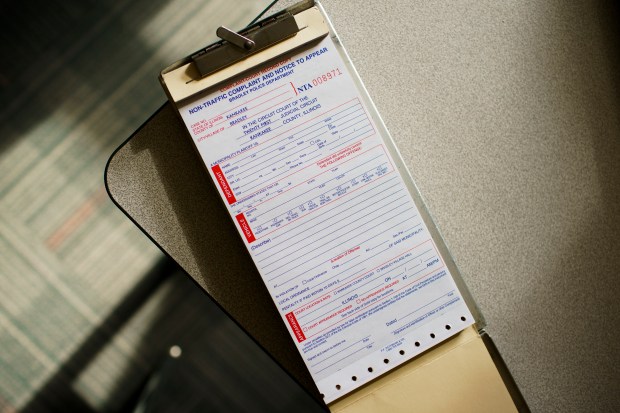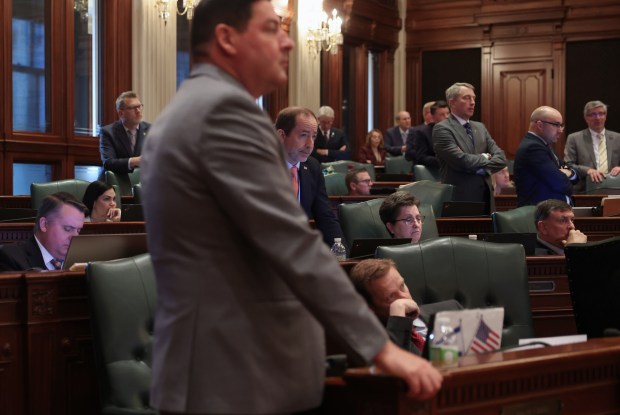Citing an urgency to protect students’ civil rights in a second Trump administration, Illinois lawmakers filed a new bill Monday that would explicitly prevent school police from ticketing and fining students for misbehavior.
The legislation for the first time also would require districts to track police activity at schools and disclose it to the state — data collection made more pressing as federal authorities have signaled they will deemphasize their role in civil rights enforcement.
A 2022 Tribune-ProPublica investigation, “The Price Kids Pay,” found that even though Illinois law bans school officials from fining students directly, districts skirt the law by calling on police to issue citations for violating local ordinances. It also found that Black students were twice as likely to be ticketed at school than their white peers.
Following the news investigation, the governor, state superintendent and lawmakers urged schools to stop the practice, but legislative efforts repeatedly stalled. The bill introduced Monday in the Illinois House takes a new approach to end police ticketing at schools by making clear that police can arrest students for crimes or violence but that they cannot ticket students for violating local ordinances prohibiting a range of infractions, including vaping, disorderly conduct, truancy and other behavior.
That distinction was not clear in previous versions of the legislation, which led to concern that schools would not be able to involve police in serious matters — and was a key reason legislation on ticketing floundered. The tickets, which are issued for civil violations of local laws, often are adjudicated in administrative hearings where students typically don’t get legal representation.
Rep. La Shawn Ford, a Democrat from Chicago and the bill’s chief sponsor, said ticketing students for vaping is an example of how current policies are failing. He said it’s important that school districts disclose what types of police interactions are taking place to monitor for civil rights violations and other concerns.
“We definitely need to make sure to enshrine what we believe into law. We can’t let Trump policies dictate our morals,” Ford said. “Our schools should be a place where we protect students from the school-to-prison pipeline, period.”
Several advocacy groups, which have been drafting the legislation along with the Illinois State Board of Education, say there is new energy behind the stronger, more precise version of legislation that they unsuccessfully pushed in the 2023 and 2024 legislative sessions.
The earlier bills never got a full vote in either chamber. The Illinois Association of Chiefs of Police was among those objecting to the bills because of fears over limiting police responses to criminal activity.
Patrick Kreis, a vice president for the chiefs association, said the group is in favor of police staying out of student disciplinary matters such as truancy and vaping. He has not yet seen the new bills but said the group will work with lawmakers and advocates “to see if there is a way to make this work where we can still do this job and appreciate the underlying concern being raised.”
Aimee Galvin with Stand for Children, an Illinois nonprofit that pushes for education equity and racial justice, said ensuring districts track police involvement is a way of “Trump proofing” students’ civil rights.
“We would like to see this data in Illinois,” Galvin said. “If policy were to change at the (U.S. Department of Education), we would lose all data about how schools are interacting with law enforcement, and that is really concerning to us.”
The civil rights division of the U.S. Education Department for years has collected broad information about how often police are involved with students and how often students are arrested. President Donald Trump has said he wants to dismantle the department, and it’s not clear what impact that would have on the civil rights data collection. And the federal government has never monitored student ticketing.
A second bill that also aims to curb police activity in schools is expected to be filed in the Illinois Senate on Tuesday. Although it also would aim to end ticketing, it likely will take a different approach than the House version by prohibiting school administrators from calling on police to write tickets as a disciplinary consequence. It also would bar schools from referring truant students or their parents to authorities to be issued a fine.
Ford and Senate sponsor Karina Villa, a Democrat from West Chicago, said they expect to draw from debate about both bills to earn broad support and refine the final version of the legislation.

There have been some piecemeal changes and efforts at reform following the “Price Kids Pay” investigation, including a state attorney general investigation that confirmed school administrators were exploiting a loophole in state law by asking police to ticket students. That investigation found a large suburban Chicago district broke the law when it directed police to fine students and the practice disproportionately affected Black and Latino students. The state’s top legal authority declared the practice illegal and said it should stop.
But the House and Senate sponsors of the new legislation said that without it, the practice will continue. Records show that school-based police have ticketed students at high schools in Kankakee County in the eastern part of the state, East Peoria in central Illinois and Monmouth near the western border with Iowa over the past year for a range of infractions such as possessing tobacco, fighting or drinking alcohol.
In one town, students received fines as high as $450 this fall for possession of cannabis; in another, truancy fines for dozens of students and their families are being sent to collections.
“They should not be fining families and they should not be directing officers to issue tickets to students,” Villa said of schools where students receive tickets. “Our bill is intended to stop the practice.”
Other state leaders also have said they want to end the practice of ticketing students at school, including Gov. JB Pritzker and the state schools superintendent, Tony Sanders. The Illinois State Board of Education made preventing students from being ticketed at school as discipline one of this session’s legislative priorities in December.
Board spokesperson Jackie Matthews said changing the law is necessary “particularly because of the disproportionate impact this practice has on students of color.”
“We are continuing to work with stakeholders and lawmakers to arrive at a solution that protects students,” she said.




